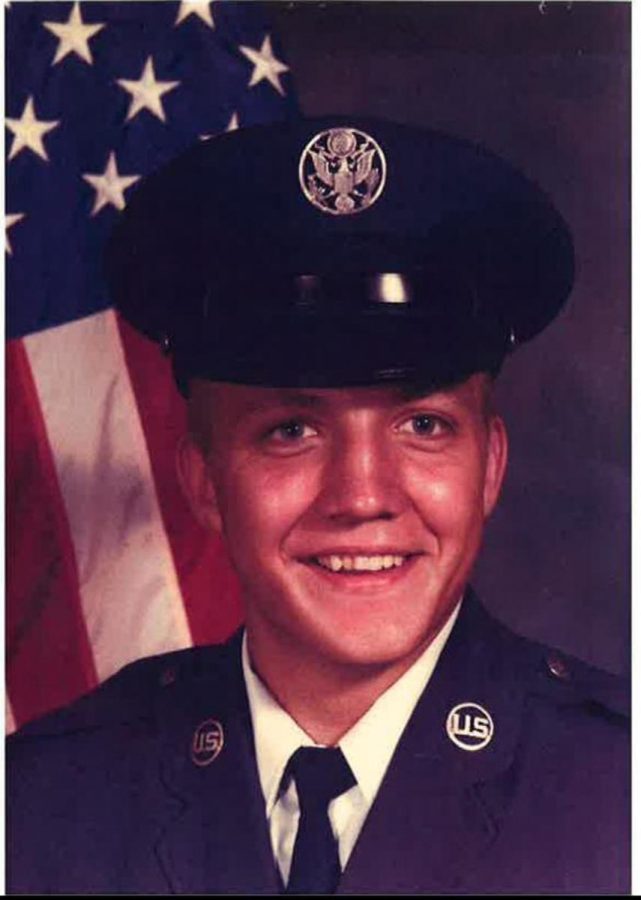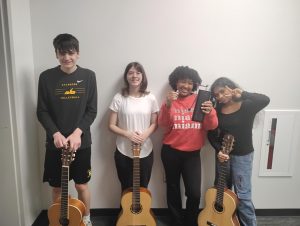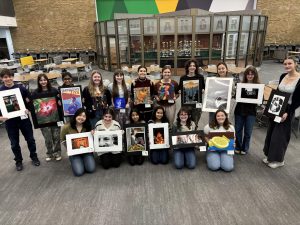Remembering veterans’ service: Mader and Corattiyil
Mader served in the Air Force during the Cold War. When he left the Air Force he had held the rank of Staff Sargent E5. He was stationed in Europe and in Omaha.
November 11, 2014

Corattiyil served in the Navy after college. He was on duty for four years. He was stationed on the Aircraft Carrier USS Dwight D. Eisenhower.
Interview with Mr. Ashwin Corattiyil
Q:What branch of the military were you in?
A: I was in the Navy from 2005-2009.
Q: Did you serve in any overseas theater?
A: I did. I served one deployment on the USS Dwight D. Eisenhower, which is an aircraft carrier, in the Persian Gulf for eight months. Then I served one deployment in Afghanistan where I was attached to an Army unit for a year.
Q: Why did you choose to join the Navy?
A: After college I just knew I wanted to join the military. I didn’t know a lot about any of the branches and I was doing some research on them and trying to figure out the ups and downs of them. I talked to all the recruiters and the Navy was the one that fit me the best.
Q: Did you go to the Naval Academy or were you in an ROTC program at the college you went to?
A: No, I did not go to the military academy or do an ROTC in college. I did what is called Officer Candidate School which is a 13 week program for college graduates. It was in Pensacola, Florida at the time. It is kind of like a boot camp and that is how I got trained.
Q: How did serving in the Navy change your life?
A: I think the military in general gives you leadership and career experiences that you would never get at ages 20 or 22 years old. You are put into situations where you have a huge amount of responsibility but also are very rewarding because you feel like you’re helping not just our country but maybe countries around the world. One of the best things about it was that I met some of the greatest people I have ever met during my time in the Navy. They are some of the most selfless, really just awesome people that I have ever known.
Q: Are you still in touch with any of your old shipmates?
A: I am. There are a few guys I’ve kept in touch with. Sometimes it gets hard because we all move a lot, especially the people that stay in. But now with email and social media and everything, it’s a lot easier. My really close buddies I am still in touch with. One of them was in my wedding.
Q: How has being in the Navy helped you become an administrator here at Sycamore?
A: The Navy and the military is probably the most diverse employer in the world. It’s people from all walks of life, all parts of the country, all racial and ethnic backgrounds, all different income levels so you see a huge variety of types of people and that’s what I think is the biggest thing I have been able to bring over to other jobs. You get to interact and deal with a lot of different types of people. I think we are all the same on some level but it is nice to have that experience in the military to draw from.
Q:Did you have any challenges adjusting back to civilian life?
A: In some things it wasn’t like it was really hard and I couldn’t do it. You really notice the difference between military and civilian life. When you first make the transition back you come back from a deployment and you are stationed in the states for a while because you are essentially working a 9 to 5 job when you are stationed here. In the evening and weekends you get your own civilian life. I guess the biggest adjustment is dealing with the culture because the military is really big on the chain of command and if you have an issue you take it to the person above you and they take it to the person above them and so forth. Civilian world is not like that and they have a very different way of operating. In the military you know a structure and you know why you are doing something, I think because there is an end goal. In civilian world that’s not always as clear. So little things like that were noticeable to me when I got back.
Interview with Mr. Doug Mader
Q: What branch of the military were you in?
A: I was in the United States Air Force.
Q: How long did you serve?
A: I served four years of active duty.
Q: Did you serve overseas?
A: I was, I lived in Germany for two years. I supported the main hospital for Europe at the time. I then supported a spy plane for two years out of Omaha, Nebraska. I spent two months in the deserts in Egypt on a special mission and I also went to England several times on special missions.
Q: What were the years you served?
A: 1980 to 1984.
Q: How did going into the military impact your view on life?
A: I was not a motivated teenager so when I went into the Air Force it changed my whole self esteem and it gave me discipline, self-direction and motivation. It allowed me to have a lot of responsibility, it helped me mature and helped me travel the world.
Q: Are you in touch with any of your fellow service members who you have served with?
A: There is only one person I served with in Germany and I played basketball with while I was over there and we communicate with each other about once a year.
Q: Did you have any difficulty adjusting back to civilian life?
A: No, because when I served it was during the Cold War so we didn’t have any major conflicts going on like they do today. So the transition to civilian life was a pretty easy transition for me.
Q: Did you go to the Air Force Academy or do an ROTC program at your university?
A: No, I went straight into the Air Force. I was enlisted and left as a Staff Sergeant E5 which wasn’t common back then to do that in four years.
Q: How has being in the military helped you be a better principal while you were at Kings and now here at Sycamore?
A: It helped me be a principal knowing there are teenagers in the world that may not be very motivated. There’s always a way to change your direction and discipline. I was able to change mine. In the military there is a lot of structure so that is what I try to bring somewhat to a school, that we have processes and procedure in place so that we help kids find their passions in life.
Q: What made you choose the Air Force?
A: When I was 18 years old and it was December and my father sat me down and told me I wasn’t ready to go to college and I wasn’t going to stand next to him in a factory. So I needed to choose what I was going to do and there was a lot of men in my life who I respected and they were pretty successful and all of them went into the Air Force.







